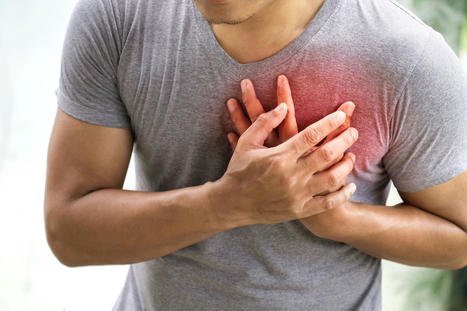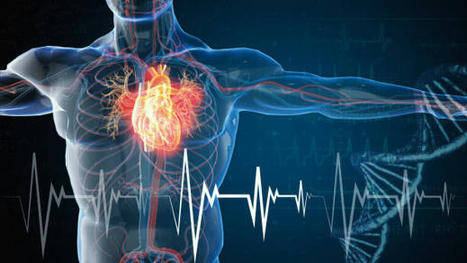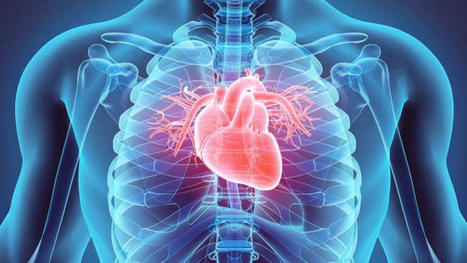 Your new post is loading...
 Your new post is loading...
Introduction The heart is a fantastic muscle in the body that allows hormones, oxygenated blood, and nutrients to travel and transport to all the muscles, tissues, and organs, providing functionality to the body. As one of the main components of the cardiovascular system, the heart works together with the lungs to help carry the deoxygenated blood to the pulmonary system to dispose of waste from the body. The human body needs the heart to stay healthy; however, factors like stress, obesity, autoimmune diseases, and unhealthy habits can affect the heart, causing cardiac issues associated with various body problems. Today’s article focuses on coronary heart disease, what are the risks associated with coronary heart disease, and ways to prevent coronary heart disease from progressively getting worse. We refer patients to certified providers specializing in cardiology treatments that help those with issues of coronary heart disease. We also guide our patients by referring to our associated medical providers based on their examination when it’s appropriate. We find that education is the solution to asking our providers insightful questions. Dr. Alex Jimenez DC provides this information as an educational service only. Disclaimer What Is Coronary Heart Disease? Have you been experiencing hypertension in your body or near your heart? How about unexplained chest pains that randomly showed up? Have you experienced pain running down your shoulders and arms? Many of these are signs that you could be experiencing coronary heart disease. Research studies have defined coronary heart disease as a common heart condition with plaque formation in the heart vessels that cuts off the supply of oxygenated blood to the heart and the rest of the body. As part of cardiovascular diseases, coronary heart disease can cause overlapping profile issues over time if it is not treated right away. Many disruptive factors can affect the heart muscle like: - Age and gender
- Oxidative stress
- Inflammation
- Vascular immune dysfunction
- Lack of physical activities
These disruptive factors can increase cardiovascular disease mortality that can affect the heart and be co-morbidities associated with different issues affecting the body. Studies reveal that the mechanisms of cardiac pain are associated with the chest and upper left arm pain. This is defined as referred pain where the sensory input from visceral organs mimics cardiac distress, and the corresponding muscles are affected. But how does this correlate to the heart muscle, and why does the chest experience pain? Visceral pain is a bit trickier to diagnose when cardiovascular disorders overlap the risk profiles associated with other issues affecting the body. For example, you could be experiencing pain in your chest and upper back, but your brain is telling you something is affecting your heart. General Disclaimer * The information herein is not intended to replace a one-on-one relationship with a qualified health care professional, licensed physician, and is not medical advice. We encourage you to make your own health care decisions based on your research and partnership with a qualified health care professional. Our information scope is limited to chiropractic, musculoskeletal, physical medicines, wellness, sensitive health issues, functional medicine articles, topics, and discussions. We provide and present clinical collaboration with specialists from a wide array of disciplines. Each specialist is governed by their professional scope of practice and their jurisdiction of licensure. We use functional health & wellness protocols to treat and support care for the injuries or disorders of the musculoskeletal system. Our videos, posts, topics, subjects, and insights cover clinical matters, issues, and topics that relate to and support, directly or indirectly, our clinical scope of practice.* Our office has made a reasonable attempt to provide supportive citations and has identified the relevant research study or studies supporting our posts. We provide copies of supporting research studies available to regulatory boards and the public upon request. We understand that we cover matters that require an additional explanation of how it may assist in a particular care plan or treatment protocol; therefore, to further discuss the subject matter above, please feel free to ask Dr. Alex Jimenez or contact us at 915-850-0900. Dr. Alex Jimenez DC, MSACP, CCST, IFMCP*, CIFM*, ATN* email: coach@elpasofunctionalmedicine.com Licensed in: Texas & New Mexico*
Introduction In the body’s upper half, the cardiovascular system’s heart helps pump nutrient-riched oxygenated blood all around the body to the corresponding muscles, tissues, and organs to keep the body functional. The heart is protected by the ribcage and muscles surrounding the heart organ from any external factors that can cause harm to the body. When these factors do cause an effect on the body, it can lead to many issues like thoracic back pain, cardiovascular problems, gut disorders, and even chest pains. These issues affect a person, causing them to feel crummy and dampen their outlook. Today’s article will look at chest pains, how it affects the gut and heart in the body, and how viscerosomatic dysfunction is associated with chest pains. We refer patients to certified, skilled providers specializing in osteopathic and cardiovascular treatments that help those suffering from chest pains and cardiovascular disorders. We also guide our patients by referring to our associated medical providers based on their examination when it’s appropriate. We find that education is critical for asking insightful questions to our providers. Dr. Alex Jimenez DC provides this information as an educational service only. Disclaimer Can my insurance cover it? Yes, it may. If you are uncertain, here is the link to all the insurance providers we cover. If you have any questions or concerns, please call Dr. Jimenez at 915-850-0900. What Are Chest Pains? Have you noticed your heart is beating irregularly? How about acid reflux that is affecting your chest constantly? Have you felt muscle stiffness or tenderness in the middle regions of your back? Or have you felt your chest harden and stiffen after something impacted you? Many of these symptoms are tell-tale signs of you experiencing chest pains in your upper body. Research studies have defined chest pains as a common type of visceral pain that is a dull, deep pressure that squeezes the chest. This results in the visceral afferent nerves aggravated as they cause shoulder pain, jaw pain, or thoracic back pain since the nerve root reaches the spinal cord. Additional research studies have found that chest pains can have a variety of cardiac disorders as they can cause dysfunction in the muscles and skeletal joints within the chest walls or the thoracic regions of the spine. When the thoracic region of the spine becomes affected due to chest pains, it can cause herniation on the spinal discs, thus resulting in unwanted pain and discomfort to the individual. Chest pain can even affect the gut system and the heart itself. General Disclaimer * The information herein is not intended to replace a one-on-one relationship with a qualified health care professional, licensed physician, and is not medical advice. We encourage you to make your own health care decisions based on your research and partnership with a qualified health care professional. Our information scope is limited to chiropractic, musculoskeletal, physical medicines, wellness, sensitive health issues, functional medicine articles, topics, and discussions. We provide and present clinical collaboration with specialists from a wide array of disciplines. Each specialist is governed by their professional scope of practice and their jurisdiction of licensure. We use functional health & wellness protocols to treat and support care for the injuries or disorders of the musculoskeletal system. Our videos, posts, topics, subjects, and insights cover clinical matters, issues, and topics that relate to and support, directly or indirectly, our clinical scope of practice.* Our office has made a reasonable attempt to provide supportive citations and has identified the relevant research study or studies supporting our posts. We provide copies of supporting research studies available to regulatory boards and the public upon request. We understand that we cover matters that require an additional explanation of how it may assist in a particular care plan or treatment protocol; therefore, to further discuss the subject matter above, please feel free to ask Dr. Alex Jimenez or contact us at 915-850-0900. Dr. Alex Jimenez DC, MSACP, CCST, IFMCP*, CIFM*, ATN* email: coach@elpasofunctionalmedicine.com Licensed in: Texas & New Mexico*
Introduction In the cardiovascular system, the heart’s main purpose is to pump blood throughout the entire body and to transport nutrients, hormones, and oxygen to the necessary musculoskeletal tissues and organs that need to do their job properly. When there are pathogens that enter the body, whether it is a poor lifestyle or poor nutrition that can cause the body to develop chronic illnesses, it can cause damage to the cardiovascular system. Some of the cardiovascular disease risk factors like dyslipidemia can disrupt the body’s blood flow throughout the body. In this 2 part series, we will be taking a look at what nutraceuticals are used to dampen the effects of dyslipidemia. In part 1, we discussed what dyslipidemia is, its symptoms, and how chronic inflammatory macro-and micronutrients can affect the cardiovascular system. By referring patients to qualified and skilled providers who specialized in cardiovascular services. To that end, and when appropriate, we advise our patients to refer to our associated medical providers based on their examination. We find that education is the key to asking valuable questions to our providers. Dr. Alex Jimenez DC provides this information as an educational service only. Disclaimer Can my insurance cover it? Yes, in case you are uncertain here is the link to all the insurance providers we cover. If you have any questions, please call Dr. Jimenez at 915-850-0900. What Does Dyslipidemia Do To The Body? In part 1, dyslipidemia is where the lipid levels in the blood are either too high or too low in the bloodstream. As research shows when individuals are getting a routine blood test from their primary healthcare provider, they are unaware that they may have dyslipidemia. If it gets severe or untreated, dyslipidemia can lead to other cardiovascular diseases like coronary artery disease and peripheral artery disease. Dyslipidemia Factors Research shows that dyslipidemia is an imbalance of lipids in the body that can cause a variety of disorders that can affect the body and can be classified into five categories. When there is an imbalance of lipids in the bloodstream, it is due to many factors that can cause dyslipidemia to go unnoticed until it is severe and it leads to cardiovascular disease with severe complications. These factors can be: General Disclaimer * The information herein is not intended to replace a one-on-one relationship with a qualified health care professional, licensed physician, and is not medical advice. We encourage you to make your own health care decisions based on your research and partnership with a qualified health care professional. Our information scope is limited to chiropractic, musculoskeletal, physical medicines, wellness, sensitive health issues, functional medicine articles, topics, and discussions. We provide and present clinical collaboration with specialists from a wide array of disciplines. Each specialist is governed by their professional scope of practice and their jurisdiction of licensure. We use functional health & wellness protocols to treat and support care for the injuries or disorders of the musculoskeletal system. Our videos, posts, topics, subjects, and insights cover clinical matters, issues, and topics that relate to and support, directly or indirectly, our clinical scope of practice.* Our office has made a reasonable attempt to provide supportive citations and has identified the relevant research study or studies supporting our posts. We provide copies of supporting research studies available to regulatory boards and the public upon request. We understand that we cover matters that require an additional explanation of how it may assist in a particular care plan or treatment protocol; therefore, to further discuss the subject matter above, please feel free to ask Dr. Alex Jimenez or contact us at 915-850-0900. Dr. Alex Jimenez DC, MSACP, CCST, IFMCP*, CIFM*, ATN* email: coach@elpasofunctionalmedicine.com Licensed in: Texas & New Mexico*
Introduction The heart’s purpose in the cardiovascular system is to make sure that oxygen-riched blood, nutrients, and hormones are being pumped and transported throughout the body and into the muscle tissues and organs that need it. When there are pathogens that enter into the bloodstream, it can cause many risk factors to the cardiovascular system, it can lead to chronic symptoms over time if it is not treated right away. In this 2 part series, we will be taking a look at cardiac metabolism and how HCTP can help renew the cardiovascular system. Part 2 will be discussing what is diastolic dysfunction in the cardiovascular system and how different nutraceuticals can help prevent heart disease from rising. By referring patients to qualified and skilled providers who specialized in cardiovascular services. To that end, and when appropriate, we advise our patients to refer to our associated medical providers based on their examination. We find that education is the key to asking valuable questions to our providers. Dr. Jimenez DC provides this information as an educational service only. Disclaimer Can my insurance cover it? Yes, in case you are uncertain here is the link to all the insurance providers we cover. If you have any questions, please call Dr. Jimenez at 915-850-0900. What Is Cardiac Metabolism? Since the heart’s job is to make sure that blood is pumping throughout the body, studies have found that the network for cardiac fuel metabolism contains an intricate set of interacting pathways that produces endpoint results for both ATP-producing and non-ATP-producing energy. However, when there are pathogens that are affecting the cardiac metabolism it can lead to chronic conditions like congestive heart failure. Research studies have shown that congestive heart failure is an energy-starved heart and is associated with metabolic changes in the body, it can cause a progressive impairment of cardiac and musculoskeletal high energy phosphate production in the heart. This will decrease ATP concentration causing serious defects in cellular metabolism and causing pulsation of the cellular structure in the heart muscles. With the roles of ATP vs. oxygen in myocyte of the cellular structure can also play their parts when dealing with modulating cardiac metabolism as a therapeutic approach to heart failure. Cellular Mitochondria Also known as the powerhouse of cells, the cellular mitochondria contain about 3500 – 5000 mitochondria, and the myocyte contains 35% of the entire cell. Research shows that the cellular mitochondria can help take the food that a person eats and turn it into energy for the cells can use. This helps ATP to formed in mitochondria and transfer to the cytosol to supply energy to the cell. There are 2 functions that the cellular mitochondria provide for the body while making sure that the cellular structure is healthy. The mitochondrial respiration is not all oxygen, that is converted to CO2 and water in the body but contains about 3-5% of oxygen, which are toxic free radicals. Mitochondrial DNA is more similar to bacterial DNA unlike nuclear DNA and provides defensive mechanisms that are just emerging and have proven to be very useful for tracing genetic lines. General Disclaimer * The information herein is not intended to replace a one-on-one relationship with a qualified health care professional, licensed physician, and is not medical advice. We encourage you to make your own health care decisions based on your research and partnership with a qualified health care professional. Our information scope is limited to chiropractic, musculoskeletal, physical medicines, wellness, sensitive health issues, functional medicine articles, topics, and discussions. We provide and present clinical collaboration with specialists from a wide array of disciplines. Each specialist is governed by their professional scope of practice and their jurisdiction of licensure. We use functional health & wellness protocols to treat and support care for the injuries or disorders of the musculoskeletal system. Our videos, posts, topics, subjects, and insights cover clinical matters, issues, and topics that relate to and support, directly or indirectly, our clinical scope of practice.* Our office has made a reasonable attempt to provide supportive citations and has identified the relevant research study or studies supporting our posts. We provide copies of supporting research studies available to regulatory boards and the public upon request. We understand that we cover matters that require an additional explanation of how it may assist in a particular care plan or treatment protocol; therefore, to further discuss the subject matter above, please feel free to ask Dr. Alex Jimenez or contact us at 915-850-0900. Dr. Alex Jimenez DC, MSACP, CCST, IFMCP*, CIFM*, ATN* email: coach@elpasofunctionalmedicine.com Licensed in: Texas & New Mexico*
Introduction The heart plays an important role in the body by pumping blood into the arteries, veins, and blood vessels to be transported through every muscle tissue and organ system so that they are doing their job correctly. From the central nervous system to the gut system all the way to the endocrine system, blood cells are being transported and moving throughout the body to make it functional. When unknown pathogens or stressors start to enter the body, it can cause a major disruption to the body through chronic illnesses and symptoms that can cause the body to be dysfunctional. In this 2 part series, we will be taking a look at diagnosis concepts for cardiovascular disease. In part 2, we will continue to discuss the diagnosis concepts for cardiovascular disease and be taking a look at the risk factors that cause cardiovascular disease. By referring patients to qualified and skilled providers who specialized in cardiovascular services. To that end, and when appropriate, we advise our patients to refer to our associated medical providers based on their examination. We find that education is the key to asking valuable questions to our providers. Dr. Alex Jimenez DC provides this information as an educational service only. Disclaimer Can my insurance cover it? Yes, in case you are uncertain here is the link to all the insurance providers we cover. If you have any questions, please call Dr. Jimenez at 915-850-0900. What Is The Cardiovascular System? Since the heart plays an important part in the cardiovascular system by making sure that blood is pumping through the arteries and veins. Research shows that the cardiovascular system has an important function by getting oxygenated blood and nutrients throughout the entire body and removing waste out of the body as well. The body’s cellular structure actually depends on the cardiovascular system to keep things running smoothly. When disruptors like cardiovascular disease start affecting the heart, it can lead to many complications that can harm the body. How To Prevent Heart Disease Since heart disease is the number one cause of death in the US and studies have found that cardiovascular disease can cause mortality and morbidity in the body and can actually be one of the many factors for hypertension. The annual cost is 320 billion dollars for individuals that go through heart disease treatments in order to feel better. However, about 80 percent of heart disease ( heart attacks, angina, coronary heart disease, and congestive heart failure) can be prevented by non-surgical treatments like: General Disclaimer * The information herein is not intended to replace a one-on-one relationship with a qualified health care professional, licensed physician, and is not medical advice. We encourage you to make your own health care decisions based on your research and partnership with a qualified health care professional. Our information scope is limited to chiropractic, musculoskeletal, physical medicines, wellness, sensitive health issues, functional medicine articles, topics, and discussions. We provide and present clinical collaboration with specialists from a wide array of disciplines. Each specialist is governed by their professional scope of practice and their jurisdiction of licensure. We use functional health & wellness protocols to treat and support care for the injuries or disorders of the musculoskeletal system. Our videos, posts, topics, subjects, and insights cover clinical matters, issues, and topics that relate to and support, directly or indirectly, our clinical scope of practice.* Our office has made a reasonable attempt to provide supportive citations and has identified the relevant research study or studies supporting our posts. We provide copies of supporting research studies available to regulatory boards and the public upon request. We understand that we cover matters that require an additional explanation of how it may assist in a particular care plan or treatment protocol; therefore, to further discuss the subject matter above, please feel free to ask Dr. Alex Jimenez or contact us at 915-850-0900. Dr. Alex Jimenez DC, MSACP, CCST, IFMCP*, CIFM*, ATN* email: coach@elpasofunctionalmedicine.com Licensed in: Texas & New Mexico*
|
Introduction In the body, the heart is a vital organ that pumps blood to all the muscles, organs, tissues, and ligaments that require the body to function and move. As part of the cardiovascular system, the heart keeps the body alive by supplying nutrients and disposing of waste and carbon dioxide away from the body. Various factors can affect the body and the heart as well stressful events, unhealthy eating habits, limited physical activities, or autoimmune conditions can cause strain on the heart. Still, they can correlate to different symptoms in the body. This causes an overlap of risk profiles that may feel something is wrong with the heart but might affect another body part. Today’s article focuses on viscero-somatic pain affecting more than the heart muscle, how referred pain is defined, and various ways for treating viscero-somatic pain in the body. We refer patients to certified providers specializing in cardiovascular and chiropractic treatments that help those with issues that affect their hearts. We also guide our patients by referring to our associated medical providers based on their examination when it’s appropriate. We find that education is the solution to asking our providers insightful questions. Dr. Alex Jimenez DC provides this information as an educational service only. Disclaimer Visceral-Somatic Pain Affecting More Than The Heart Are you experiencing radiating pain affecting your neck, arms, or back? How about feeling discomfort in your chest? Do gut issues seem to cause a burning sensation affecting your chest? Many of these symptoms overlap in risk profiles that seem like issues in the heart but can refer to something else affecting the body. This is known as viscero-somatic pain, usually defined as pain coming from the internal organs affecting the muscles that share the same nerve. Studies revealed that the autonomic nervous system mediates visceral-somatic pain. For the heart, the parasympathetic innervation comes from the cardiac branches of the vagus nerves connected to the spine and the brain. Since there is extensive autonomic innervation of the heart, the vagus nerve has a minor role in afferent pain transmission signaling. An example would be having esophageal issues that are causing chest pains in your chest. So how would that correlate to the heart? Think of it as a person experiencing chest pains and whose brain is being signaled that something is wrong with their heart. Then, when they get treated, their results show that it was esophageal issues. Studies have revealed that spinal neurons receive input from a distal esophagus and receive the same information from the heart through viscero-somatic and viscero-visceral convergence. So what does this mean? This means that the sympathetic innervation of the heart is in a casual relationship to the first five thoracic spinal nerves. This indicates that some pain fibers affecting the heart are directly from the upper thoracic spine. Additional studies have mentioned that the vagus nerve connected to the upper thoracic spine can influence harmful afferent signals of the visceral organs to involve pain and joint stiffness in multiple organs and body structures. General Disclaimer * The information herein is not intended to replace a one-on-one relationship with a qualified health care professional, licensed physician, and is not medical advice. We encourage you to make your own health care decisions based on your research and partnership with a qualified health care professional. Our information scope is limited to chiropractic, musculoskeletal, physical medicines, wellness, sensitive health issues, functional medicine articles, topics, and discussions. We provide and present clinical collaboration with specialists from a wide array of disciplines. Each specialist is governed by their professional scope of practice and their jurisdiction of licensure. We use functional health & wellness protocols to treat and support care for the injuries or disorders of the musculoskeletal system. Our videos, posts, topics, subjects, and insights cover clinical matters, issues, and topics that relate to and support, directly or indirectly, our clinical scope of practice.* Our office has made a reasonable attempt to provide supportive citations and has identified the relevant research study or studies supporting our posts. We provide copies of supporting research studies available to regulatory boards and the public upon request. We understand that we cover matters that require an additional explanation of how it may assist in a particular care plan or treatment protocol; therefore, to further discuss the subject matter above, please feel free to ask Dr. Alex Jimenez or contact us at 915-850-0900. Dr. Alex Jimenez DC, MSACP, CCST, IFMCP*, CIFM*, ATN* email: coach@elpasofunctionalmedicine.com Licensed in: Texas & New Mexico*
Introduction The cardiovascular system‘s main role is to make sure that blood is pumping from the heart to all over the rest of the body through the veins and arteries. The blood cells are transporting oxygen, hormones, and nutrients to each of the organ systems. From the gut to the brain to the endocrine system, they need these blood cells to do their jobs properly. When there are disruptors that can affect the body, especially the cardiovascular system it can do some serious damage by conducting cardiovascular diseases to develop over time and cause the body pain. In this article, we will be taking a look at the difference between precision and personalized medicine for cardiovascular disease, the genetics, and genomics of CVD, as well as looking at how glutathione helps reduce CVD. By referring patients to qualified and skilled providers who specialized in cardiovascular services. To that end, and when appropriate, we advise our patients to refer to our associated medical providers based on their examination. We find that education is the key to asking valuable questions to our providers. Dr. Alex Jimenez DC provides this information as an educational service only. Disclaimer Can my insurance cover it? Yes, in case you are uncertain here is the link to all the insurance providers we cover. If you have any questions, please call Dr. Jimenez at 915-850-0900. What Is The Difference Between Personalized & Precision Medicine? So personalized medicine is actually a medical model that separates people into different groups, which includes medical decisions, practices, interventions, and/or products that are being tailored to the individual patient based on their predicted response or risk of disease. Research studies showed that personalized medicine for cardiovascular disease is an emerging concept that can help manage an individual’s symptoms and even provide guidance for selecting treatments. Since cardiovascular disease still remains one of the leading causes of death, by focusing on the research and treatment, the individual is there with their healthcare provider to make the decisions. Other research studies have shown that personalized medicine treatment for cardiovascular disease is tailored to the individual with all the decisions and practices to not only treat cardiovascular disease but to figure out what is the best course of action to treatment. Precision Medicine For Cardiovascular Disease Precision Medicine is where medical care is designed to optimize efficiency or therapeutic benefit for particular groups of patients, especially by using genetic or molecular profiling. Surprisingly though, studies have stated that precision medicine has a more integrative approach to cardiovascular disease prevention and treatment by looking into the individual’s exposure to their cardiovascular health as determinants, while also finding strategies to improve cardiovascular health and preventing chronic diseases from rising in the body. General Disclaimer * The information herein is not intended to replace a one-on-one relationship with a qualified health care professional, licensed physician, and is not medical advice. We encourage you to make your own health care decisions based on your research and partnership with a qualified health care professional. Our information scope is limited to chiropractic, musculoskeletal, physical medicines, wellness, sensitive health issues, functional medicine articles, topics, and discussions. We provide and present clinical collaboration with specialists from a wide array of disciplines. Each specialist is governed by their professional scope of practice and their jurisdiction of licensure. We use functional health & wellness protocols to treat and support care for the injuries or disorders of the musculoskeletal system. Our videos, posts, topics, subjects, and insights cover clinical matters, issues, and topics that relate to and support, directly or indirectly, our clinical scope of practice.* Our office has made a reasonable attempt to provide supportive citations and has identified the relevant research study or studies supporting our posts. We provide copies of supporting research studies available to regulatory boards and the public upon request. We understand that we cover matters that require an additional explanation of how it may assist in a particular care plan or treatment protocol; therefore, to further discuss the subject matter above, please feel free to ask Dr. Alex Jimenez or contact us at 915-850-0900. Dr. Alex Jimenez DC, MSACP, CCST, IFMCP*, CIFM*, ATN* email: coach@elpasofunctionalmedicine.com Licensed in: Texas & New Mexico*
Introduction The heart’s primary role in the cardiovascular system is to make sure that blood, nutrients, and hormones are being transported throughout the entire body. The cardiovascular system is consist of the arteries, veins, and blood vessels that are throughout the body and this system make sure to pump blood into the organs and tissues. When there are pathogens that cause the cardiovascular system to develop cardiac risk factors, it can cause many chronic issues over time and can potentially harm the body. In this 2 part series, we will be taking a look at what is diastolic dysfunction in the cardiovascular system and how different nutraceuticals can prevent heart disease from rising in the body. Part 1 took a look into what is cardiac metabolism and how HCTP can help renew the cardiovascular system. By referring patients to qualified and skilled providers who specialized in cardiovascular services. To that end, and when appropriate, we advise our patients to refer to our associated medical providers based on their examination. We find that education is the key to asking valuable questions to our providers. Dr. Jimenez DC provides this information as an educational service only. Disclaimer Can my insurance cover it? Yes, in case you are uncertain here is the link to all the insurance providers we cover. If you have any questions, please call Dr. Jimenez at 915-850-0900. What Is Diastolic Dysfunction? The diastolic function requires more cellular energy than systolic contraction as higher concentrations of ATP are required to activate calcium pumps necessary to facilitate cardiac relaxation and diastolic filling. Studies show that diastolic dysfunction is a collective number of issues from hypertension, diabetes, age, and left ventricular hypertrophy that causes increased levels of cardiac oxidative stress and cardiac ROS in the heart. Surprisingly, diastolic dysfunction is more common in women with hypertension, IHSS, MVP, and infiltrative cardiomyopathy, and the best way to know the early signs of myocardial failure due to diastolic despite the adequate systolic function in the heart. The energetic imbalance of diastolic heart failure is characterized by an increase in energy demand and a decrease in energy production, transfer, and substrate utilization resulting in an ATP deficit. The biopsies of heart tissue in heart failure patients reveal diminished quantities of ATP in the mitochondria and studies show that diastolic heart failure occurs when the left ventricle is unable to accept adequate volumes of blood. General Disclaimer * The information herein is not intended to replace a one-on-one relationship with a qualified health care professional, licensed physician, and is not medical advice. We encourage you to make your own health care decisions based on your research and partnership with a qualified health care professional. Our information scope is limited to chiropractic, musculoskeletal, physical medicines, wellness, sensitive health issues, functional medicine articles, topics, and discussions. We provide and present clinical collaboration with specialists from a wide array of disciplines. Each specialist is governed by their professional scope of practice and their jurisdiction of licensure. We use functional health & wellness protocols to treat and support care for the injuries or disorders of the musculoskeletal system. Our videos, posts, topics, subjects, and insights cover clinical matters, issues, and topics that relate to and support, directly or indirectly, our clinical scope of practice.* Our office has made a reasonable attempt to provide supportive citations and has identified the relevant research study or studies supporting our posts. We provide copies of supporting research studies available to regulatory boards and the public upon request. We understand that we cover matters that require an additional explanation of how it may assist in a particular care plan or treatment protocol; therefore, to further discuss the subject matter above, please feel free to ask Dr. Alex Jimenez or contact us at 915-850-0900. Dr. Alex Jimenez DC, MSACP, CCST, IFMCP*, CIFM*, ATN* email: coach@elpasofunctionalmedicine.com Licensed in: Texas & New Mexico*
Introduction In the cardiovascular system, the heart’s primary role in the body is to pump blood into the arteries, veins, and blood vessels to be transported throughout the entire body, giving oxygen-riched blood and nutrients to each muscle tissue and organ system so that they are doing their job. These blood cells are making sure that the body is functional. When there are disruptors that can cause the body to develop chronic illnesses, it can disrupt the cardiovascular system with chronic illnesses if it is not treated right away. In this 2 part series, we will continue the discussion of diagnosis concepts for cardiovascular disease and take a look at risk factors that causes cardiovascular disease in the body. Part 1 took a look at the diagnosis concepts for cardiovascular disease. By referring patients to qualified and skilled providers who specialized in cardiovascular services. To that end, and when appropriate, we advise our patients to refer to our associated medical providers based on their examination. We find that education is the key to asking valuable questions to our providers. Dr. Alex Jimenez DC provides this information as an educational service only. Disclaimer Can my insurance cover it? Yes, in case you are uncertain here is the link to all the insurance providers we cover. If you have any questions, please call Dr. Jimenez at 915-850-0900. What Is Cardiovascular Disease? In the cardiovascular system, the heart makes sure that the blood is pumping and traveling all throughout the body. When there are unwanted pathogens that enter the body, it can cause an array of problems. Studies have shown that cardiovascular disease is a cluster of diseases that can affect the heart. Some of the risk factors can even help the development of atherosclerosis and this can be numerous factors which include: CVD & Chest Pain Evaluation As a number one cause of death in the US, one of the symptoms that cardiovascular disease is chest pains. Since there are 60,000 miles of arteries in the human body, studies have found that chest pains and shortness of breath are common in cardiovascular diseases and that they can become a risk factor for future cardiovascular morbidity and mortality rate in the body. Exertional precordial or substernal chest pressure, tightness, or chest pain with or without radiation to arms, neck, and shoulders or back and associated with: General Disclaimer * The information herein is not intended to replace a one-on-one relationship with a qualified health care professional, licensed physician, and is not medical advice. We encourage you to make your own health care decisions based on your research and partnership with a qualified health care professional. Our information scope is limited to chiropractic, musculoskeletal, physical medicines, wellness, sensitive health issues, functional medicine articles, topics, and discussions. We provide and present clinical collaboration with specialists from a wide array of disciplines. Each specialist is governed by their professional scope of practice and their jurisdiction of licensure. We use functional health & wellness protocols to treat and support care for the injuries or disorders of the musculoskeletal system. Our videos, posts, topics, subjects, and insights cover clinical matters, issues, and topics that relate to and support, directly or indirectly, our clinical scope of practice.* Our office has made a reasonable attempt to provide supportive citations and has identified the relevant research study or studies supporting our posts. We provide copies of supporting research studies available to regulatory boards and the public upon request. We understand that we cover matters that require an additional explanation of how it may assist in a particular care plan or treatment protocol; therefore, to further discuss the subject matter above, please feel free to ask Dr. Alex Jimenez or contact us at 915-850-0900. Dr. Alex Jimenez DC, MSACP, CCST, IFMCP*, CIFM*, ATN* email: coach@elpasofunctionalmedicine.com Licensed in: Texas & New Mexico*
Introduction The heart is part of the cardiovascular system that makes sure that the blood is being pumped through the arteries and going to each organ system and muscle tissue. The blood also carries oxygen, nutrients, and hormones to each of the different systems and makes sure that they are doing their job properly. When there are unwanted pathogens that enter the body and disrupt the cardiovascular system, it can cause the arteries and blood vessels to be damaged. These problems, if not treated, can develop into chronic illnesses like inflammation, high blood pressure, oxidative stress over time. In this 2 part series, we will be taking a look at the cardiovascular system and its functions, what is cardiovascular disease and how to prevent it. Part 1 took a look at what is the vascular system, its function, and discussed what vascular aging is. By referring patients to qualified and skilled providers who specialized in cardiovascular services. To that end, and when appropriate, we advise our patients to refer to our associated medical providers based on their examination. We find that education is the key to asking valuable questions to our providers. Dr. Jimenez DC provides this information as an educational service only. Disclaimer Can my insurance cover it? Yes, in case you are uncertain here is the link to all the insurance providers we cover. If you have any questions, please call Dr. Jimenez at 915-850-0900. What Is The Cardiovascular System? The cardiovascular system is made up of the heart, blood vessels, and the blood itself in the body. Its main purpose is to transport the nutrients and oxygen-riched blood all over the body. Research shows that the cardiovascular system is responsible for different parts of the body and has two blood circulatory systems in the body that are responsible for the blood being transported throughout the body. The first system is the systemic circulatory system and this is the main system that transports blood to the organs and tissues throughout the body. The second system is the pulmonary circulatory system and this system helps move the blood between the heart and the lungs. The pulmonary circulatory system makes sure that oxygen is entering the blood cells while carbon dioxide is leaving the blood cells in the body. Cardiovascular Function One of the most important things the cardiovascular system does is that the blood continues to flow throughout the body. Research shows that the main function of the cardiovascular system is that it makes sure that the body receives oxygen, nutrients, and hormones from the respected organ system and gets rid of the unnecessary toxins out of the body. Another function that the cardiovascular system provides is a continuous blood flow day and night. So if the individual is either awake or asleep, the heart will continue to circulate the blood flow throughout the body. The cardiovascular system also helps the body gets the necessary nutrients so the organs can do their job and keep the body’s temperature at a normal level. General Disclaimer * The information herein is not intended to replace a one-on-one relationship with a qualified health care professional, licensed physician, and is not medical advice. We encourage you to make your own health care decisions based on your research and partnership with a qualified health care professional. Our information scope is limited to chiropractic, musculoskeletal, physical medicines, wellness, sensitive health issues, functional medicine articles, topics, and discussions. We provide and present clinical collaboration with specialists from a wide array of disciplines. Each specialist is governed by their professional scope of practice and their jurisdiction of licensure. We use functional health & wellness protocols to treat and support care for the injuries or disorders of the musculoskeletal system. Our videos, posts, topics, subjects, and insights cover clinical matters, issues, and topics that relate to and support, directly or indirectly, our clinical scope of practice.* Our office has made a reasonable attempt to provide supportive citations and has identified the relevant research study or studies supporting our posts. We provide copies of supporting research studies available to regulatory boards and the public upon request. We understand that we cover matters that require an additional explanation of how it may assist in a particular care plan or treatment protocol; therefore, to further discuss the subject matter above, please feel free to ask Dr. Alex Jimenez or contact us at 915-850-0900. Dr. Alex Jimenez DC, MSACP, CCST, IFMCP*, CIFM*, ATN* email: coach@elpasofunctionalmedicine.com Licensed in: Texas & New Mexico*
|



 Your new post is loading...
Your new post is loading...

















Dr. Alex Jimenez gives an insightful look at how risk issues are associated with coronary heart disease in the body. If you have any questions or concerns, please call Dr. Jimenez at 915-850-0900.